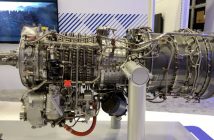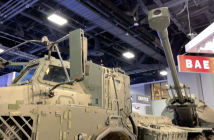Rt. Hon. Anne-Marie Trevelyan, MP, UK minister of defence procurement, discusses Britain’s shipbuilding strategy, investing to develop the high-tech workforce of the future, coping with a devalued pound that has increased acquisition of American weapons like the F-35 Lightning II fighter, P-8 Poseidon maritime patrol aircraft and more, and inspiring a new generation of women to seek careers in national security with Defense & Aerospace Report Editor Vago Muradian following her keynote address at the DSEI conference and tradeshow in London. Our coverage is sponsored by L3Harris and Leonardo DRS and in partnership with Clarion Events — DSEI’s organizer — and working with the UK Department of International Trade’s Defence & Security Organisation to bring our audience the best in British defense.
Vago Muradian: Welcome to the Defense and Aerospace Report. I’m Vago Muradian here at the Excel Center in London covering this 20thAnniversary gathering of DSEI, one of the world’s truly great defense and systems shows covering air, land, sea, space, cyber and more. Our coverage here is sponsored by L3Harris, Leonardo DRS. We’re partnered with Clarion Events that puts on this great trade show and so many others, and we’re working with the UK Department of International Trade, Defence and Security Organization to bring you the very best in British defense.
One of the very best in British defense is here with us, Anne-Marie Trevelyan who is the Minister for Defence Procurement of the United Kingdom. Dressed very patriotically at this terrific event.
I want to start with shipbuilding strategy. I know you can’t tell me who won the Type 31 contract. There’s a lot of speculation that it’s Babcock, and that there are a little bit of concerns about the importance of that company given what it does on the nuclear side, whether the frigates will take away from the nuclear program.
But there are broader shipbuilding questions as well. For example, whether the oilers are going to be built in the United Kingdom or not, or acquired from abroad. The government has made quite a discussion of its shipbuilding strategy.
How does all of this fit into a coherent whole at a time when Britain is trying to support local industry but at the same time still trying to get best value at the end of the day. How do you square all of these different circles?
Minister Anne-Marie Trevelyan: I think it’s a really great step that actually we asked Sir John Parker to come and have a proper review of our shipbuilding. He wasn’t entirely positive. He threw some pretty hard challenges both at the department and indeed at our shipbuilding industry. And we’ve taken that up with real gusto. The Navy has led the way in terms of thinking really strategically about where they want to be taking the way they deliver hard power and indeed humanitarian relief and peacekeeping efforts from the sea.
So there’s now a huge piece of work going on. So we have got an enormous kind of regeneration of class. We will have the new Type 31’s, the SSS support ships. We’ve got so much work going on —
Mr. Muradian: Type 26 in build.
Minister Trevelyan: Type 26 are in build. We have the Astute class submarines coming through. The Dreadnought program for the next generation of our bomber submarines. So a huge amount of work in our shipyards going on, led by some really great organizations.
I think one of the great challenges we have, and not only in shipbuilding, across the board in the defense industry, and I mentioned it today in my speech, is the challenge of the human capital resource. Do we have enough of the right people with the great skills we need to really drive forth this industry and help it to grow so that it is resilient for the long term, so that things like the Type 26 contract — the Australians are buying, the Canadians are buying, so they’re going to have their shipyards too. They too have that challenge of human capital resource.
How do we think much more holistically working with young people to really infuse them to be part of the defense industry? Because that is critical. We can have the greatest [fighters]in the world. It’s still people who make it all happen. Whether they’re building it or driving it.
So that’s what we need to really work through, and I’m working very closely with our major suppliers and our own industry to really think about what it is we need to be doing to make sure that this is the sort of fascinating career option that more people take.
Mr. Muradian: I want to bring you on women, that’s going to be the last question. But let me ask you quickly about finances.
The pound has been underwater for a while. It’s way below the rate at which most of these systems were bought. Britain has bought an enormous number, whether it’s P-8s, F-35 or big U.S. systems at the end of the day. Very susceptible to exchange rate fluctuations. You’ve lived here now for a couple of years where these programs are underwater, costing hundreds of millions of pounds. Effectively sort of two Type 31s a year are sort of going to this.
At what point A, does this auger for buying more kit domestically at the end of the day so you’re buying in pounds? That’s the first question.
Second, given that this could be rather protracted, at what point do you need to go back to Washington and to the contractors and say hey, we need to renegotiate and change some of these. Because even though it’s on a ten-year cycle through Treasury, the last couple of years of that get really, really dicey at a time when you have such an ambitious agenda.
Minister Trevelyan: Currently fluctuation is the reality of international marketing activity. So indeed, if we’re importing goods we have a currency risk, but that is factored in in large part. And as you say, over a ten-year equipment plan, a rolling ten-year equipment plan, we always factor in the risk of currency exchange fluctuation. But the reality is, we’re not buying all our [inaudible]in one go. Those risks are stretched. And you know, as they always say, things can go up as well as down. There’s a reality that we simply have to work with that year in and year out.
But the important part, perhaps, is that imports is one way to, indeed, as you say, growing our own, getting British industry to make what it is we need if it can be made here and we have the best both value for money and indeed technical outputs here. But also to export. Because if you have import risk on the one hand, if you’re selling exports, you know, our goods are cheaper for the great, greatest that you could get.
So there’s much work for us to do and that’s very much part of my role, is to encourage those of our allies who are looking to invest in their equipment programs to think about buying British. Because you get the very best, and with the pound in the state that it’s in you get a better value for money.
Mr. Muradian: Do you need to renegotiate at any point, though? Because it was Brexit that drove the pound down. Is that something that you think at some point you’ll renegotiate? Or that’s not on the table at this moment?
Minister Trevelyan: The Treasury and the MOD have an ongoing conversation about the effects of currency risks, and that’s obviously a conversation that will keep being looked at.
Mr. Muradian: Let me ask you about women. A great statement you make on, I always would like to have more women on my program. So anybody who’s available, come and join us. But talk to us a little bit about that. The importance of this agenda and program that you’ve just launched in order to encourage women to come into defense jobs and by looking at examples, whether it’s Penny Mordaunt or you to sort of get attracted to careers in defense, whether on engineering or on any other part.
Minister Trevelyan: Absolutely. I always say you know, there’s a place for women. Any industry that hasn’t got women in their mix are missing a trick because we bring great skill sets, great self-discipline, all sorts of characteristics which are, you know, female-centric and you want them on your team. If you don’t, you’re missing out.
So the challenge is for what has been an all-male preserve for a long time, and that comes from history. That’s no great surprise. But actually, the technological environment that the military work in is not only about strength. There are so many different skills required and across industry. Both from design through to hard engineering, through to so much in the cyberspace area. So much that is not gender-specific anymore. And actually, we have an opportunity, but also a responsibility to make sure that the young women out there absolutely know that this is a fantastic career opportunity. They can flex, they can travel, you can work for some incredible companies, you can serve. There are so many ways to be part of the defense family, and I want to see more women in that area.
Mr. Muradian: And we would like that very, very much as well.
Anne-Marie Trevelyan, Minister for Defence Procurement of the United Kingdom. Thanks so very, very, much. Best of luck at DSEI. Thanks for joining us.
Minister Trevelyan: Thank you. It’s a pleasure.
30


